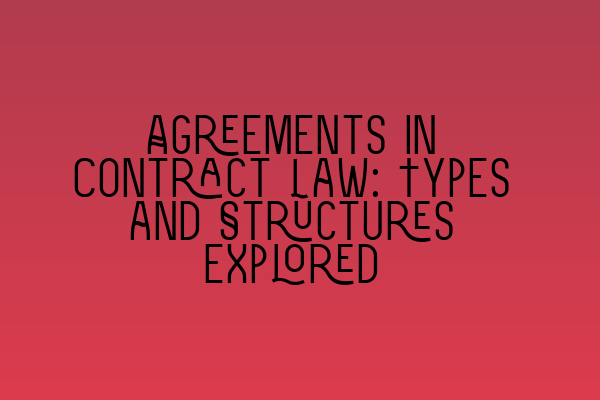Agreements in Contract Law: Types and Structures Explored
When it comes to contract law, agreements are the foundation upon which legal relationships are built. A contract is a legally binding agreement between two or more parties, outlining the rights and obligations of each party. To understand contracts better, it’s essential to explore the different types and structures of agreements in contract law. In this article, we will dive into the various aspects of agreements and shed light on their significance in the legal landscape.
1. Express and Implied Agreements
Contracts can be classified as either express or implied agreements. An express agreement is formed when the parties explicitly negotiate and agree upon the terms and conditions. This agreement can be in written or oral form. On the other hand, an implied agreement is created when the parties’ conduct suggests the existence of an agreement, even if it is not explicitly stated. Implied agreements can arise from the parties’ actions, industry customs, or previous dealings.
2. Unilateral and Bilateral Contracts
Another way contracts can be categorized is based on the promise made by the parties involved. In a unilateral contract, one party makes a promise in exchange for the performance of an action by the other party. For example, a company offers a reward for finding a lost item. The person who finds and returns the item is entitled to the reward. In contrast, a bilateral contract involves mutual promises between the parties. Each party agrees to perform certain actions or provide something of value to the other party.
3. Valid, Void, and Voidable Contracts
Contracts can further be classified as valid, void, or voidable. A valid contract is legally enforceable and meets all the necessary requirements, such as offer, acceptance, consideration, capacity, and legality. However, if a contract lacks any of these elements, it may be considered void or voidable. A void contract is fundamentally defective from the beginning and has no legal effect. For example, a contract that involves illegal activities or is contrary to public policy is considered void. On the other hand, a voidable contract is initially valid but can be avoided or canceled by one or both parties due to certain circumstances, such as fraud, duress, or undue influence.
4. Standard Form Contracts
Standard form contracts, also known as adhesion contracts, are agreements that are drafted by one party and presented to the other party on a take-it-or-leave-it basis. These contracts are commonly used in consumer transactions, insurance policies, and employment agreements. Standard form contracts are often prepared by the party with more bargaining power, leaving the other party with limited negotiation options. Courts carefully scrutinize these contracts for any unfair or unconscionable terms.
5. Executed and Executory Contracts
An executed contract is one in which both parties have fulfilled their obligations and completed all the terms outlined in the agreement. The performance or fulfillment of the contract has occurred. In contrast, an executory contract is still in progress, and some or all of the obligations under the contract have not yet been performed. For example, when buying a house, the contract is considered executory until the transfer of ownership takes place.
In conclusion, agreements form the basis of contract law and play a crucial role in establishing legal relationships. Understanding the different types and structures of agreements can help both solicitors and clients navigate the complexities of contract law more effectively. Whether it’s an express or implied agreement, a unilateral or bilateral contract, or a valid, void, or voidable contract, each type has its own legal implications. By familiarizing themselves with these concepts, individuals can make informed decisions and protect their rights in contractual matters.
For further information on related topics, check out the following articles:
– Mentorship for Aspiring Solicitors: Nurturing Talent in the Legal Field
– Legal Challenges and Pitfalls: Navigating the Complexities of the Legal System
– The GDL (Graduate Diploma in Law): A Pathway to Becoming a Solicitor
– Mastering the Solicitor’s Path: Prepare for the Journey Ahead
– The Benefits of Becoming a Solicitor: A Rewarding Career
By understanding the intricacies and nuances of agreements in contract law, individuals can ensure that their rights and obligations are protected and fulfilled. Contract law is an essential aspect of various industries and sectors, and having a solid understanding of agreements is crucial for both legal professionals and parties entering into contractual relationships.
